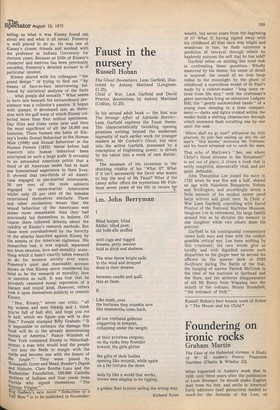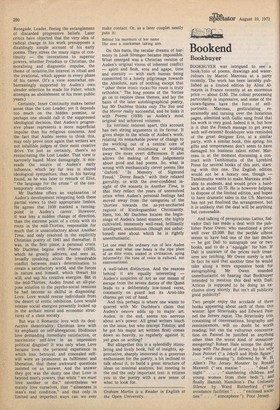Foundering on ironic rocks
Graham Martin
The Case of the Helmeted Airman: A Study of W. H. Auden's Poetry Francoise Duchene (Chatto & Windus E3).
What happened in Auden's work that in 1939, only three years after the publication of Look Stranger, he should shake English dust from his feet, and settle in America? Early admirers (and detractors) tended to reach for the formula of the Lost, or Renegade, Leader, fleeing the entanglement of discarded progressive beliefs. Later critics have objected that the very idea of radical change in his work presupposes a disablingly simple account of his early poems. They stress the many signs of continuity — the invocations to superior powers, whether Freudian or Christian, the moralising and diagnostic impulse, the theme of isolation,the interest in ritual and the irrational, which appear in every phase of his career. (It's a view somewhat embarrassingly supported by Auden's own slender selection he made for Faber, which attempts an abolishment of his most public years.)
Certainly, Inner Continuity makes better sense than the Lost Leader, yet it depends too much on the hidden premise, or perhaps one should call it the suppressed ideological decision, that Auden's progressive phase represents a more superficial impulse than his religious concerns. And the fact that Auden seems to think this, may only prove once again that writers are not infallible judges of their most creative drive. Yet just as certainly, there's no resuscitating the Lost Leader. That view is narrowly based. More damagingly, it misreads the source of Auden's early influence, which lay far less in shared ideological sympathies, than in his having found, as he was later to remark of Eliot, "the language for the crime" of the contemporary situation.
Mr Duchene offers an explanation of Auden's development relegating both these partial views to their appropriate limbos. He agrees that 1939 marked a turningpoint in Auden's career. However, it was less a sudden change of direction, than the extreme point of a crisis with its roots in the mid-Thirties, responsible for much that is unsatisfactory about Another. Time, and only resolved in the explicitly Christian poetry of 1941 and thereafter. It was, in the first place, a personal crisis. Mr Duchene begins with Poems (1930), which he greatly admires, and sees as, broadly speaking, about the irresolvable conflict between man's determination to create a satisfactory world, and the forces in nature and himself, which thwart his will, and sap his creative energies. Btit in the mid-Thirties, Auden found an all-purpose solution to the psycho-social tensions he had become so skilful in diagnosing: Love. Love would rescue individuals from the desert of erotic inhibition. Love would release social energies presently locked up in the archaic moral and economic structures of a class society.
But was it Romantic love with its destructive theatricality, Christian love with its emphasis on self-abnegation, libidinous love demanding immediate satisfaction, or narcissistic self-love in an impressive political disguise? It was only when Love became love, the personal experience in which loss, betrayal, and concealed selfwill were as prominent as fulfilment and liberation, that these awkward questions insisted on an answer. And the answer they got was the dusty one that Love is beyond man's powers, that while "we must love another or die," nevertheless we mainly love ourselves, that " aloneness is man's real condition," and that only in limited and imperfect ways can we ever make contact. Or, as a later couplet neatly puts it:
Behind his murmurs of her name She sees a marksman taking aim.
On this basis, the secular dreams of harmony in Look Stranger became impossible. What emerged was a Christian version of Auden's original vision of inherent conflict — spirit and flesh, eros and agape, time and eternity — with each human being committed to a lonely pilgrimage towards the Absolute, sure of nothing except that " other these ironic rocks/No route is truly orthodox." The long poems of the 'forties go on to explore these themes, and lay the basis of the later autobiographical poetry, but Mr Duchene thinks only The Sea and the Mirror really successful, and he links it with Poems (1930) as Auden's most original and achieved volumes.
Its intrinsic interest apart, this account has two strong arguments in its favour. It gives shape to the whole of Auden's work, relating its remarkable power of change to the working out of a central core of themes, without minimising or wishing away the more overt differences. It also allows the making of firm judgements about good and bad poems. So, what is wrong with mechanically clever poems like 'Oxford,' In Memory of Sigmund Freud,' 'Dover Beach' with their relaxed garrulity, or with the over-confident insight of the sonnets in Another Time, is that they reflect the years of unresolved crisis when Auden's personal feelings had moved away from the categories of the 'thirties towards the as-yet-uncharted regions of Kierkegaardian Christianity. Here, too, Mr Duchene locates the beginnings of Auden's latest manner, the highly cultivated, immensely well-read, brilliantly intelligent, unambitious (though not unbuttoned) ease about which he is rightly unenthusiastic.
Let one read the ordinary run of late Auden poems and what one hears is the ripe plum of an elite voice, soaked in civilisation, aping informality: the tone of voice is cultural, not conversational.
A well-taken distinction. And the reasons behind it are equally interesting — Auden's suspicion of Art as our means of escape from the severe duties of the Quest leads to a deliberately low-toned verse, constantly on guard lest its Ariel-like charms get out of hand.
And this perhaps is where one wants to quarrel with Mr Duchene's claim that Auden's oeuvre adds up to major art. Auden, in the end, seems too nervous about art's power. All great writers touch on the issue, but who (except Tolstoy, and he got his major art written first) comes down so heavily, so regularly against it: yet goes on writing?
But altogether this is a splendidly stimulating and lively book, full of insights, appreciative, sharply immersed in a generous enthusiasm for the poetry, a bit inclined to talk about it, to build a great structure of ideas on minimal analysis, but meeting in the end the only important test: it returns you to the poetry with a new sense of what to look for.
Graham Martin is a Reader in English at the Open University.

































 Previous page
Previous page